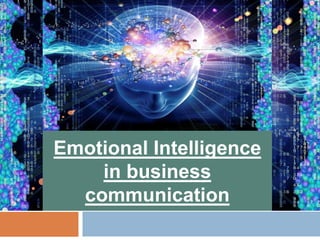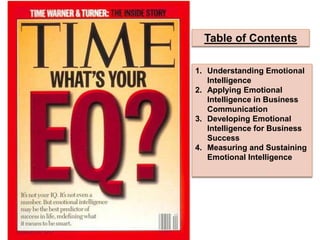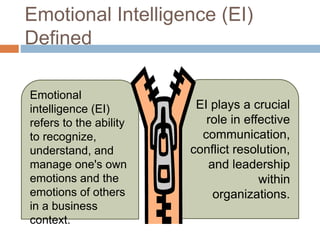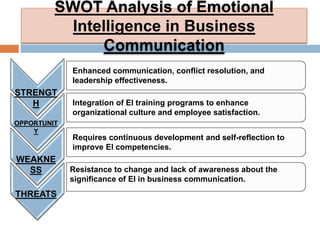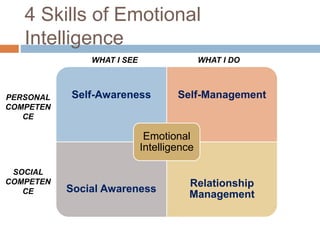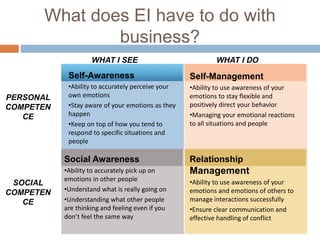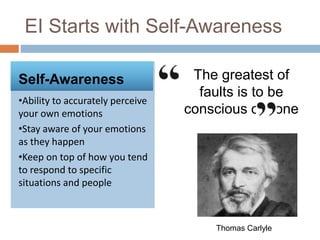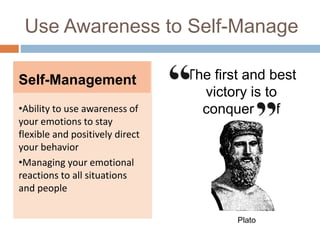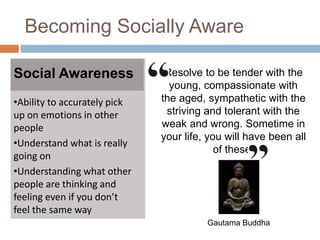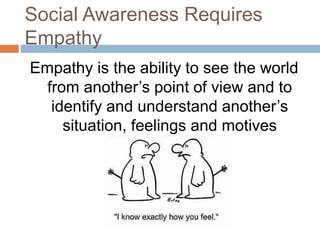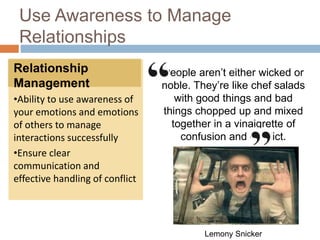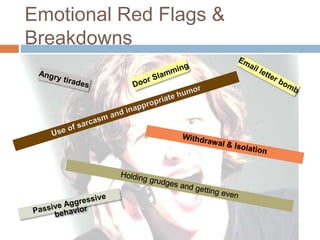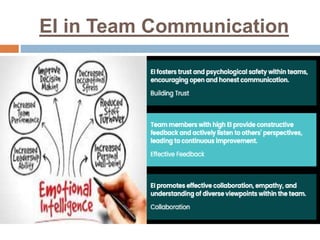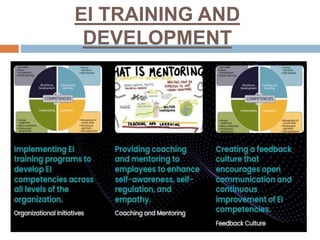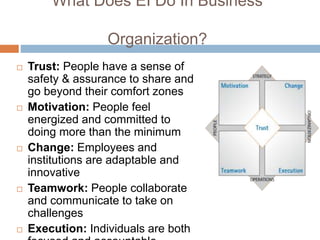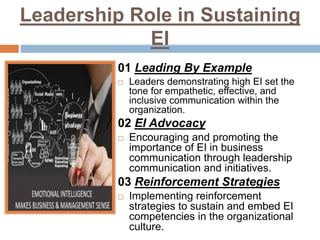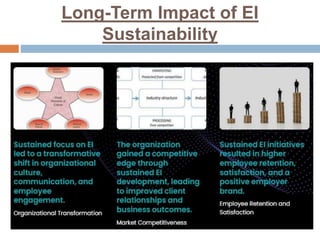Emotional_Intelligence_Presentation.pptx
- 2. Table of Contents 1. Understanding Emotional Intelligence 2. Applying Emotional Intelligence in Business Communication 3. Developing Emotional Intelligence for Business Success 4. Measuring and Sustaining Emotional Intelligence
- 3. Emotional Intelligence (EI) Defined Emotional intelligence (EI) refers to the ability to recognize, understand, and manage one's own emotions and the emotions of others in a business context. EI plays a crucial role in effective communication, conflict resolution, and leadership within organizations.
- 4. SWOT Analysis of Emotional Intelligence in Business Communication STRENGT H OPPORTUNIT Y WEAKNE SS THREATS Enhanced communication, conflict resolution, and leadership effectiveness. Requires continuous development and self-reflection to improve EI competencies. Resistance to change and lack of awareness about the significance of EI in business communication. Integration of EI training programs to enhance organizational culture and employee satisfaction.
- 5. 4 Skills of Emotional Intelligence Self-Awareness Self-Management Social Awareness Relationship Management Emotional Intelligence WHAT I SEE WHAT I DO PERSONAL COMPETEN CE SOCIAL COMPETEN CE
- 6. What does EI have to do with business? Self-Management ŌĆóAbility to use awareness of your emotions to stay flexible and positively direct your behavior ŌĆóManaging your emotional reactions to all situations and people Social Awareness ŌĆóAbility to accurately pick up on emotions in other people ŌĆóUnderstand what is really going on ŌĆóUnderstanding what other people are thinking and feeling even if you donŌĆÖt feel the same way Self-Awareness ŌĆóAbility to accurately perceive your own emotions ŌĆóStay aware of your emotions as they happen ŌĆóKeep on top of how you tend to respond to specific situations and people Relationship Management ŌĆóAbility to use awareness of your emotions and emotions of others to manage interactions successfully ŌĆóEnsure clear communication and effective handling of conflict PERSONAL COMPETEN CE SOCIAL COMPETEN CE WHAT I SEE WHAT I DO
- 7. EI Starts with Self-Awareness Self-Awareness ŌĆóAbility to accurately perceive your own emotions ŌĆóStay aware of your emotions as they happen ŌĆóKeep on top of how you tend to respond to specific situations and people The greatest of faults is to be conscious of none Thomas Carlyle
- 8. Use Awareness to Self-Manage Self-Management ŌĆóAbility to use awareness of your emotions to stay flexible and positively direct your behavior ŌĆóManaging your emotional reactions to all situations and people The first and best victory is to conquer self Plato
- 9. Becoming Socially Aware Social Awareness ŌĆóAbility to accurately pick up on emotions in other people ŌĆóUnderstand what is really going on ŌĆóUnderstanding what other people are thinking and feeling even if you donŌĆÖt feel the same way Resolve to be tender with the young, compassionate with the aged, sympathetic with the striving and tolerant with the weak and wrong. Sometime in your life, you will have been all of these. Gautama Buddha
- 10. Social Awareness Requires Empathy Empathy is the ability to see the world from anotherŌĆÖs point of view and to identify and understand anotherŌĆÖs situation, feelings and motives
- 11. Use Awareness to Manage Relationships Relationship Management ŌĆóAbility to use awareness of your emotions and emotions of others to manage interactions successfully ŌĆóEnsure clear communication and effective handling of conflict People arenŌĆÖt either wicked or noble. TheyŌĆÖre like chef salads with good things and bad things chopped up and mixed together in a vinaigrette of confusion and conflict. Lemony Snicker
- 12. Emotional Red Flags & Breakdowns
- 13. EI in Team Communication
- 15. What Does EI Do In Business Organization? ’é© Trust: People have a sense of safety & assurance to share and go beyond their comfort zones ’é© Motivation: People feel energized and committed to doing more than the minimum ’é© Change: Employees and institutions are adaptable and innovative ’é© Teamwork: People collaborate and communicate to take on challenges ’é© Execution: Individuals are both
- 16. Leadership Role in Sustaining EI 01 Leading By Example ’é© Leaders demonstrating high EI set the tone for empathetic, effective, and inclusive communication within the organization. 02 EI Advocacy ’é© Encouraging and promoting the importance of EI in business communication through leadership communication and initiatives. 03 Reinforcement Strategies ’é© Implementing reinforcement strategies to sustain and embed EI competencies in the organizational culture.
- 17. Long-Term Impact of EI Sustainability
- 18. THANKING YOU’üŖ
Editor's Notes
- #7: Go box by box Importance of empathy Relationship management What is fundamental to any relationship, which low EI could compromise: Trust Do you think low EI in supervisors, managers or others could be correlated to employee concerns? (many of the issues we receive are because of what someone said or did and how it was perceived)
